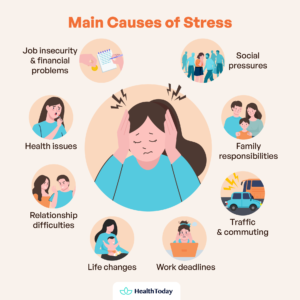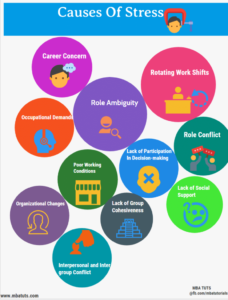Introduction:
The Main Causes Of Stress In Today’s Fast-Paced World:
In Today’s Fast- live in a where life moves faster than ever before. We can see how technology, work demands, social expectations, and personal responsibilities are all growing. We may be handling too many things at the same time. We often forget to slow down, and this leads to increasing levels of in our daily life. We can say that in today’s world, stress is not just a rare problem — it is something most of us face almost every day.
1. Financial Pressure
We often experience stress when we struggle to manage our money. We can feel pressure if our income is not enough to cover expenses. We may be worried about paying bills, rent, school fees, or loans. We can also feel anxious when unexpected costs appear. We often think about saving, but sometimes it feels impossible. Financial problems can make us lose sleep, affect our mood, and cause long-term health issues.
We can feel anxious about paying rent, school fees, or utility bills, and this pressure increases stress both at home and at work. Often, money issues also affect relationships, causing arguments and misunderstandings.
We can reduce this type of stress by creating a budget, cutting unnecessary expenses, and starting an emergency fund. We may also look for additional income sources, like freelancing or part-time work. Taking small, consistent steps toward financial stability helps us feel more in control and lowers the stress linked to money problems.
2. Work Pressure
We can face stress when our work demands are too high. We often work long hours, handle tight deadlines, and manage heavy workloads. We may be expected to give our best every day without mistakes. We can feel tired when we don’t have enough breaks or holidays. We often face pressure from managers, clients, or coworkers, which can make our mind and body tired.
When the demands of a job exceed our capacity, we often feel overwhelmed. Long working hours, unclear job roles, or lack of resources make it harder to complete tasks efficiently. This not only affects productivity but also creates a persistent sense of worry and tension. For some, workplace politics, favoritism, or lack of recognition can add to the emotional burden, making the environment even more stressful.
https://skillupwithsambhuti.co.in/causes-of-stress-in-the-modern-world-an-in-depthanalysis/
3. Lack of Time Management
We often have too much to do and too little time. We may be trying to balance work, family, studies, and personal goals. We can feel stress when the day ends but our tasks are still incomplete. We often rush, skip meals, and reduce sleep to finish our work, which only increases tension. We often feel stress when we cannot manage our time properly. We may have too many tasks to do in a short period, and this makes our mind feel overloaded.
We can sometimes procrastinate, leaving important jobs until the last moment, which increases stress. Often, trying to multitask may seem helpful, but it can reduce productivity and cause mistakes. We can reduce this stress by planning our day, making lists, and prioritizing tasks. We may also set realistic deadlines and take short breaks to refresh our mind, which helps us stay calm and focused.
4. Relationship Problems
We can face stress when our relationships are not going well. We may be arguing with family members, friends, or partners. We often feel hurt or misunderstood. We can also feel lonely when people we care about are not emotionally supportive.
We may feel hurt, angry, or disappointed when someone close to us doesn’t listen or support us. Often, arguments, misunderstandings, or even long silences can create emotional distance. This emotional tension does not only affect our feelings but also impacts our focus at work or studies, making stress worse.
5. Health Concerns
We may be worried about our health or the health of loved ones. We can feel stress if we are dealing with chronic illness, pain, or medical bills. We often feel anxious when we are waiting for test results or facing surgery. We may often experience stress when our health is not good or when a loved one is sick. We can feel anxious about treatments, medical expenses, or recovery. Often, even minor health problems can worry us if they continue for a long time.
Chronic illnesses like diabetes, heart problems, or high blood pressure can increase stress because we must constantly monitor them. We can manage this stress by following a healthy lifestyle, eating balanced meals, exercising regularly, and taking medical advice seriously. Regular check-ups and positive thinking also reduce the worry caused by health concerns.
6. Social Media and Technology Pressure
We can feel stress when we compare our life to what we see on social media. We may be spending too much time online and less time resting. We often feel pressure to look successful, happy, and perfect.
We can experience stress when we spend too much time online or compare ourselves to others on social media. We may feel that everyone else is more successful, happier, or better-looking than us, which often causes negative feelings. We can also feel pressure to respond quickly to messages, emails, or notifications. Often, overuse of technology reduces sleep, focus, and relaxation, increasing stress even more. We can reduce this stress by limiting screen time, taking digital breaks, and focusing on our real-life achievements and relationships.
7. Education Pressure
We can feel when studies are difficult. We may be worried about exams, grades, or future jobs. We often study for long hours and skip rest, which makes us mentally tired.
We often feel stress as students when we face exams, homework, or competition for higher grades. We can worry about future opportunities, scholarships, or job prospects. Many students experience stress because they study for long hours without proper rest or breaks. We can manage this stress by organizing study schedules, taking small breaks, and practicing relaxation techniques like deep breathing or meditation. We may also seek help from teachers, friends, or tutors when needed.
https://fitsdaily.com/the-connection-b…stive-problems-2/
8. Uncertainty About the Future
We often don’t know what will happen next in life. We may be worried about losing a job, failing in business, or not achieving our dreams. We can feel stress when life feels unstable.
We can often feel stress when we are unsure about what will happen in life. We may worry about career, financial security, or personal life decisions. Often, uncertainty makes our mind restless and leads to overthinking. We can manage this stress by focusing on what we can control today instead of worrying too much about the unknown. We may also plan small steps for our goals and accept that some level of uncertainty is natural in life.
9. Over commitment
We can feel stress when we say “yes” to too many things. We often try to please everyone but forget our own needs. We may be doing too many tasks at once, which drains our energy.
We often feel stress when we take on too many responsibilities at once. We may say “yes” to tasks we cannot handle, which leaves us exhausted. Often, trying to satisfy everyone makes us forget our own needs. We can reduce this stress by learning to say “no” politely, prioritizing tasks, and keeping our limits in mind. Delegating responsibilities and asking for support can also help.
10. Environmental Factors
We may be living in noisy, polluted, or unsafe places. We can feel stress when we are surrounded by negative energy, bad weather, or unsafe situations.
We can experience stress when our surroundings are uncomfortable, unsafe, or noisy. We may be affected by pollution, traffic, or crowded living spaces. Often, constant exposure to such environments makes us feel anxious or irritated. We can reduce this stress by spending time in calm and clean areas, practicing mindfulness, and creating a peaceful space at home or work. Small changes, like reducing noise or improving air quality, also make a big difference.
FAQs
Q1: What is the most common cause of stress today?
We can say financial problems and work pressure are the most common causes of stress in today’s world.
Q2: Can stress be avoided completely?
We may not be able to avoid stress completely, but we can reduce it by managing time, practicing relaxation, and maintaining a healthy lifestyle.
Q3: How does stress affect health?
We often see that stress can cause headaches, poor sleep, high blood pressure, and even heart problems.
Q4: Can exercise help reduce stress?
Yes, we can lower stress by exercising daily, which helps release tension and improves mood.
Conclusion
We can agree that the causes of stress in today’s fast-paced world are many. We often face financial issues, work demands, relationship problems, and constant time pressure. We may not be able to remove every cause, but we can control how we respond. We can create balance, take breaks, practice self-care, and seek support when needed. If we understand what is causing our stress, we can take steps to live a calmer and healthier life.


